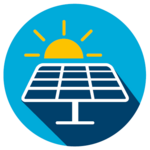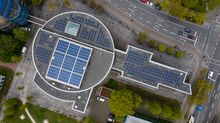Energy
Energy

The areas of energy and energy management are among the most important fields of action for achieving sustainable development and climate protection. With the intention of continuously and sustainably reducing energy consumption, the University of Oldenburg implements various energy-saving projects and energy-related renovations every year.
These measures are partly financed through intracting, which is used for new investment projects through energy improvements. The measures that are being implemented as a priority to reduce energy consumption include the renovation of outdated ventilation and heating systems, the steady expansion of lighting installations in LED and the energy modernisation of the building infrastructure. In addition, the university is also currently examining whether it would make sense to install a battery and / or hydrogen storage system to optimise photovoltaic energy.
Greenhouse gas emission
The area of building energy causes the largest share of the university's total emissions. In 2024, a total of 13,658 t CO2-equivalents were produced here, compared to 16,898 t CO2-equivalents in 2022. This area thus accounted for 63,04% of total emissions in 2024.
Photovoltaic systems
For years, the University of Oldenburg has been a pioneer in the expansion of PV systems in Lower Saxony and throughout Germany. Most recently, further systems were commissioned at the Haarentor site in March 2022. The electricity is used exclusively for the university's own needs. In total, the systems can save almost 360 tonnes ofCO2 per year.
Expansion of energy management system
In order to further reduce the energy consumption andCO2 emissions of the University of Oldenburg and the Jade University of Applied Sciences, the project to implement the expansion of the existing energy management system was launched on 2 January 2024 with funding from the Federal Ministry of Economics and Climate Protection.
Example projects
Waste heat utilisation Data Centre
The University of Oldenburg is one of the few universities in Germany to recover waste heat from parts of its Data Centre. The measure is part of the "WärmewendeNordwest" project funded by the Federal Ministry of Education and Research (BMBF), which is headed by Oldenburg energy computer scientist Prof Dr Sebastian Lehnhoff. As part of the project, several innovative cooling and heating systems are being installed at the university and intelligently linked in order to reduce energy costs andCO2 emissions.
The first measure to be implemented is a heat recovery system for the university's new high-performance computing cluster, which will be installed in 2023. "The cluster's servers are cooled with water, as modern processors have an enormous power density," reports Meik Möllers, Head of Building Management. The cooling water has a temperature of around 45 degrees Celsius when it leaves the cluster. This thermal energy is now utilised for heating: Using a high-temperature heat pump, the water is heated to 75 degrees Celsius and then fed into the university's heating network. This heat supplements the output of the combined heat and power plant on the Haarentor campus, which supplies buildings A1 to A15, the library, canteen and sports wing with heat. "As the heat from the Data Centre is available all year round, it can be used to heat the university swimming pool, for example," explains Möllers. The annual heat supply from the heat recovery system is around 500,000 kilowatt hours. This corresponds to the heating requirements of around 30 four-person households or a saving of a good 100 tonnes ofCO2.
The other servers in the Data Centre are air-cooled. A highly efficient compression refrigeration system was recently installed so that they can operate safely in future even at outside temperatures of more than 40 degrees Celsius. Thanks to these two measures, the university already fulfils the legal requirements of the new Energy Efficiency Act ahead of schedule. Coming into force at the end of 2023, it sets standards for the first time for the energy efficiency of Data Centres, which will go into operation from 2026. The university invested 2.5 million euros from its own funds to bring the cooling and power supply for the scientific computers up to date in terms of energy efficiency, with a further 300,000 euros coming from project funds.
Modernised glass facade Wechloy
The glass façade in Wechloy has been modernised - and fitted with additional photovoltaic modules. Thanks to heat-insulating panes it will stay nice and cool on the ring level and in the library in summer.
Better insulated panes, additional photovoltaic systems and a structural refurbishment: the characteristic glass façade of the 40-year-old main building on the Wechloy campus of the University of Oldenburg shines in new splendour. After a good year of construction, the inauguration ceremony took place yesterday. The 1,300 square metre, predominantly glazed area around the inner courtyard and the roof in the entrance area are now back up to date in terms of structural engineering and energy efficiency.
The renovation, which began in February 2023, comprised six construction phases. The old panes were replaced with heat-insulating and insulating solar control glass. Six dormers, two roof terraces and the façade gutter were also replaced. In order to conserve resources, the original supporting structure was retained. The façade now contains 282 photovoltaic modules with a total surface area of around 270 square metres and a peak output of 45 kilowatts.

Free cooling Data Centre
With the increasing digitalisation of research, teaching and administration at the University of Oldenburg, the demand for computing power and storage capacity is also growing, and with it the energy consumption of the IT infrastructure. With a share of around 30% of total consumption, the Data Centre is currently the largest electricity user within the university. In particular, the necessary air conditioning of the server rooms is very energy-intensive and costly. The new computer cluster therefore has an efficient cooling system using outside air. New high-performance computers are equipped with direct water-cooled server processors, which enable higher supply and return temperatures of the cooling water. Even at temperatures of up to 35°C, the outside temperature is sufficient to achieve optimum cooling of the Data Centre. Therefore, no compression chiller is required to reduce the cooling water temperature. This saves around 500,000 kWh of energy and around EUR 110,000 in energy costs every year.
Refurbishment of the ventilation system in the university library
The university's central library has received a new, particularly efficient ventilation system. It is the third measure implemented at the University of Oldenburg as part of the „WärmewendeNordwest” project funded by the Federal Ministry of Education and Research (BMFTR), which is headed by Oldenburg energy computer scientist Prof Dr Sebastian Lehnhoff.
The refurbishment will significantly reduce the library's energy consumption for ventilation: the demand for electrical energy will be reduced by 17 per cent, while more than three quarters of the energy previously used for heating will be saved thanks to the recovery of waste heat. The university is thus reducing its overall energy consumption by around 2.1 per cent and fulfils the requirements of the Energy Efficiency Act through this measure alone. The construction project cost a total of around 3.5 million euros. Around 2 million euros of this came from the WärmewendeNordwest project, while the university financed the remainder from its own funds as part of an intracting model. In the case of the new ventilation system, the energy costs saved amount to around 175,000 euros per year. The refurbishment was planned and carried out by Staatliches Baumanagement Region Nord-West and the engineering firm Ahrens GmbH from Oldenburg. (Source:PM)
Measures from climate action concept
The following list of measures in the field of action Energy & Construction can be taken from the Integrated Climate Action Concept of the university. A more detailed view of the respective sub-measures can also be viewed there.
Area of heat
- Energy efficiency in heat generation
- Waste heat utilisation for cooling
- Change of energy source for heat to electricity
- Use of renewable energy for heat
- Refurbishment of the building envelope
- Greening of buildings
- Shortening the operating times of technical systems
Electricity
- Energy efficiency in ventilation systems
- Energy efficiency in lighting
- Optimisation of cooling systems
- Use of renewable energy for electricity
- Testing energy recovery from WindLab
General
- Energy cost budgeting
- Communication
- Examination of the development of local heating networks at the municipal level
- More efficient space management
- Relocation of the faculties' small computer centres to the central computer centre
- Strengthen sustainability in building projects



